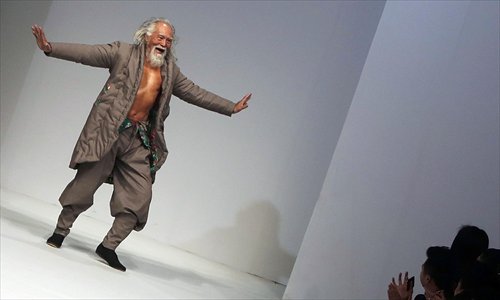79-year-old artist’s buff physique brings him fame

Wang performs at Beijing Fashion Week in March. Photo: CFP
On any given workday, most of the people working out at the DTJX Fitness center in Changping district, Beijing are retirees.
When one grey-haired man comes out of the swimming pool, showing off his muscular physique and male-model good looks, it's hard for the other members not to admire him. It's even harder to believe that he is 79 years old.
Everybody in the gym knows Wang Deshun, and that he has been an Internet sensation since earlier this year.
In March, Wang rocked the China Fashion Week runway in Beijing, taking the spotlight away from the young female models with his silver grey hair, barrel chest, and confident, playful stride.
But Wang is not your everyday Chinese grandpa who is fond of exercising on the parallel bars in the local park. His physique and stage presence come from decades of work in the fields of art and performance.
Born in 1936 in Shenyang, Northeast China's Liaoning Province, Wang is a pantomime player, artist and film actor.
"People's facial and bodily expressions are a project that I needed my whole life to explore," he said.
'Old fresh meat'
After the show, Wang's Sina Weibo page soon garnered 200,000 followers. He is now affectionately known to fans and Net users as "grandpa," "senior youth," and "old fresh meat," referring to the popular term "little fresh meat" used to describe good-looking men between the ages of 12 and 25.
However, Wang said that he was well-known in domestic and international theater circles long before the fashion show made him a viral star.
In 1979, Wang became a life model at the Lu Xun Academy of Fine Arts in Shenyang, thus beginning his journey of physical exploration. He worked as a stage actor, and during the mid-1980s, when Chinese theater warmed up to Western pantomime, Wang became one of the first generation of beipiao (people who move to Beijing from elsewhere) artists at the age of 49.
"My body is my work, and exhibiting my body is showing my work," he said.
Wang's pantomime work focuses on sculpture-like poses. The first program he created was "The Snake and the Farmer," a story about how a farmer brought a snake back to life out of pity but ended up getting bitten. He played both the farmer and the snake.
"[To perform] the role of a fetus, a prisoner, death or a snake, you need to have particular physical abilities," he said. The ability to use one's body, said Wang, is the most difficult part of his art. It is not only about being gifted with a good physique and a talent for movement, as it also requires arduous training.
Age has done nothing to stop him from carrying out daily exercises.

He swims to keep fit. Photo: Li Hao/GT
Living sculpture
Wang became very passionate when talking to the Global Times about how facial expressions and body gestures can portray a person's emotions and stories.
To demonstrate, he expressed the idea of shattered hope, staring into the air with eyes and mouth wide open, as if he had been left speechless by some life-changing news. Although he wasn't moving, his facial muscles were contracted in a way that showed a change from being hopeful to hopeless. "A small change in the muscles can completely alter the emotions expressed," he said.
On September 12 at Beijing's Modern MOMA, Wang put on a "living sculpture" performance. His whole body was painted bronze, and he performed with bronze replicas of the sculptures of Auguste Rodin (1840-1917).
The theme is the tragic love "in heaven, on earth and in hell," exhibited in three stories: Adam and Eve, Rodin and his lover, and Paolo and Francesca from Dante's Divine Comedy.
Through theater's narrative techniques, the performance shows the training that has gone into refining Wang's body and movements, as well as his understanding of and ability to communicate with modern sculpture. "For example, when I embrace Eve, audiences know that we are in love. I turn my back to her and people know we are about to break up," he explained.
The project was created in 1993 by Wang and his wife using the techniques he developed through pantomime.
"Pantomime is supposed to be happy and entertaining, but I realized that, in the end, all my works are tragic," said Wang, adding that his ideas are closely associated with his own life experience.
One of the most difficult times of his life was during the Cultural Revolution (1966-76). Wang and his wife had been married for one year when she was arrested on baseless charges.
"The pain of missing each other brought me to the verge of a mental breakdown," he said. "Once I even went to the train station, knowing that there was no way she would show up, but still held on to the slim hope that I might see my wife among the passengers."
He searched and lingered at the station for a whole day until he finally realized that he had to save himself. During their two years of separation, he tried to get involved in all kinds of hobbies. He even managed to make a television using parts that had been thrown out by factories.
"If our love hadn't been so deep, I wouldn't have been so pained. Therefore, love is suffering," he said. "Subconsciously, this experience has been integrated into my works."
Refusal to age
Unexpected fame came almost two decades after Wang reached the age of 60, the legal retirement age for Chinese men. Wang hopes his story can serve as a reminder for more senior citizens as well as an inspiration for young people. According to a National Bureau of Statistics report published in February, there are 212 million people in China aged 60 and above.
Wang's life is not limited to helping raise his grandchildren, while most of the 212 million Chinese seniors are neither able to look this fit nor continue such an active career at this age.
"I am not sure if other seniors would want to live the way I do. Most people still just seek a stable, cozy life," he said. "For thousands of years, Chinese culture has focused on stability and the Golden Mean (the Confucian doctrine that teaches people to be neither too submissive nor too aggressive). I think I might be a rebel."
Nowadays, more and more seniors have become sensations like Wang on social media as fashion icons or extreme sports pioneers, with Netizens celebrating their vitality. "I am not satisfied with a lonely and stable life. I love new challenges."
Newspaper headline: The Golden Age